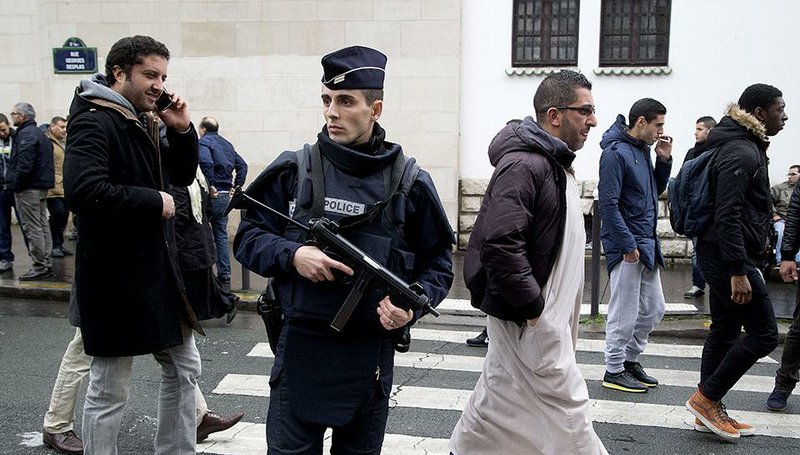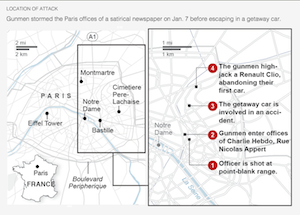PARIS -- Last week's terrorist attacks set France on edge, but the sense of wariness, even siege, has grown increasingly profound among France's Muslim population -- the largest in Europe -- which is braced for a potential backlash.
RELATED ARTICLE
http://www.arkansas…">After days of terror, France declares war
Since the attack Wednesday on the offices of the satirical newspaper Charlie Hebdo, several mosques across France have been hit by bullets or small explosive devices. Many more have been tagged with racially discriminatory graffiti. In Corsica, a severed pig's head was hung on the door of a prayer hall, police reported.
Those actions followed marches by tens of thousands in Germany who are demonstrating against what they call the Islamization of Europe, the firebombing of a mosque in Sweden and warnings by British officials about a rise in fear about Islam.
But for France, the violence in and around Paris that left 17 people dead -- including at a Jewish supermarket -- has heightened concerns that the country is at a tipping point and that there could be an open confrontation with its Muslim communities.
On Saturday, Prime Minister Manuel Valls declared that France was now at war with radical Islam. "It is a war against terrorism, against jihadism, against radical Islam, against everything that is aimed at breaking fraternity, freedom, solidarity," he said in a speech.
Hassen Farsadou, the president of the Union of Muslim Associations of Seine-Saint-Denis, said the terrorist attacks were "a despicable, criminal act, which we condemn utterly."
"But it's the rest of us who are paying the bill -- that's the problem now, and we fear it will be a problem in the future," he said. "The Muslim community is very afraid."
Farsadou said he already has received more than 100 calls from average Muslims, mostly women, reporting attacks and insults hurled at them in the streets.
Muslims, of course, are not alone in their fears of being singled out for persecution. The entire nation has been gripped by concerns that otherwise mundane crimes could be the start of another attack by jihadists.
Jewish quarters across the country are on high alert after an attack at a kosher market Friday that President Francois Hollande described as a "terrifying act of anti-Semitism." That has only increased the sense of competing communities pitted against each other.
The police said the suspect, Amedy Coulibaly, an associate of Said and Cherif Kouachi, the brothers suspected in the Charlie Hebdo attack, had declared that he wanted to defend Palestinians and target Jews.
"It has become extremely serious," Roger Cukierman, president of the Representative Council of Jewish Institutions in France, said in the French newspaper Le Monde. "I have the impression that this is a war of jihad against the West whose targets are journalists, the liberty of expression, and Jews."
Amid the rising suspicions and calls from the French right for stricter measures against Muslim radicals and immigration, many are questioning how France can close the breach.
"What needs to happen is that the Muslim elites who are representative of the broader Muslim population in all its diversity must speak out," said Olivier Roy, an expert on political Islam and a professor at the European University Institute. "We cannot have an opposition between the Islamized part of the population and mainstream society."
France's leading Islamic groups, led by Dalil Boubakeur, the director the Grand Mosque of Paris, have called repeatedly in recent days for Muslims to remain calm and exhorted imams to condemn "violence and terrorism."
Many Muslims were expected to take part in a peace march today in Paris, where Hollande will be joined by German Chancellor Angela Merkel, British Prime Minister David Cameron, Italian Prime Minister Matteo Renzi and other European leaders.
But some feared the outreach would be overshadowed by the climate of anxiety.
The attraction of radical Islam in France is a type of "youth movement," said Roy, author of a book, Holy Ignorance, that explores the lure of Islamic fundamentalism.
"We have a terrible problem in France of disenfranchised young people, with no opportunities," he said. "Many of them start off in petty delinquency, but for some of them, radical Islam is a way to find a second life -- not in society, but in terms of self-image and self-esteem."
Information for this article was contributed by Assia Labbas and Aida Alami of The New York Times.
A Section on 01/11/2015

